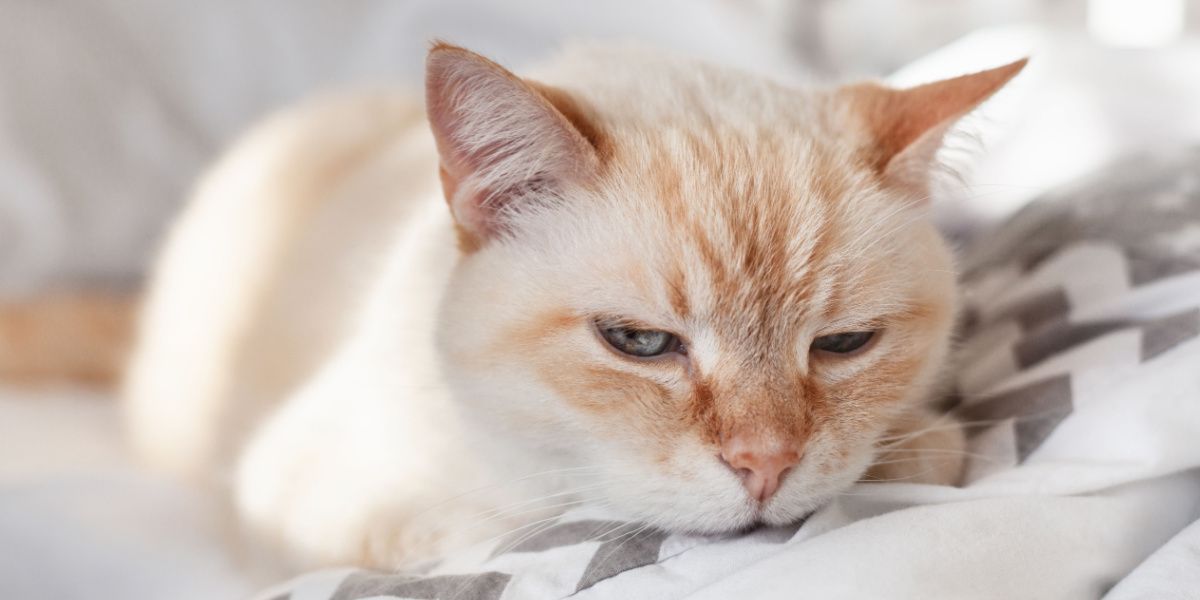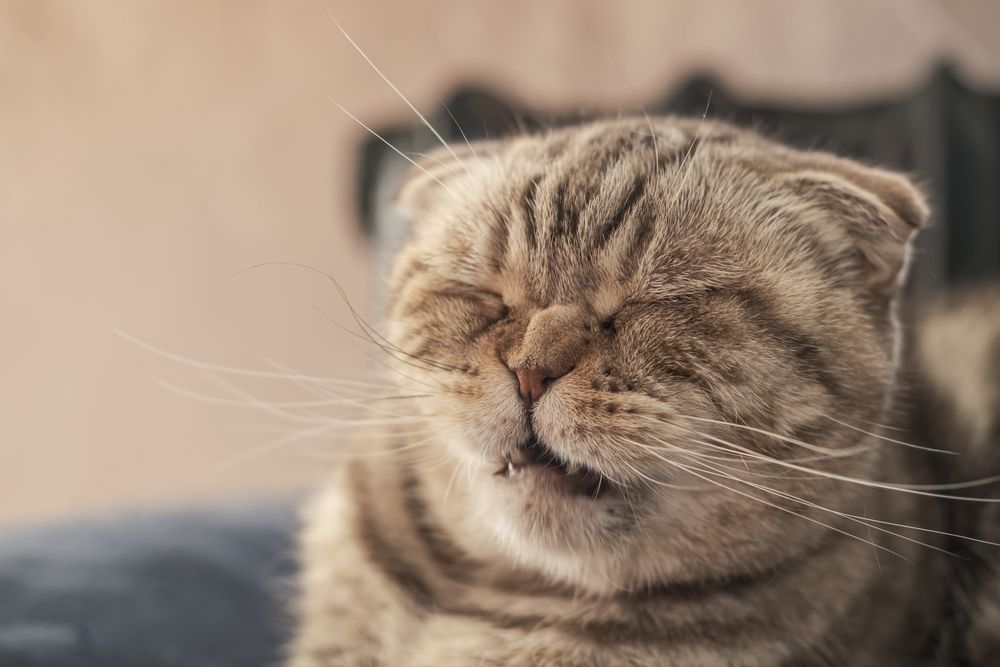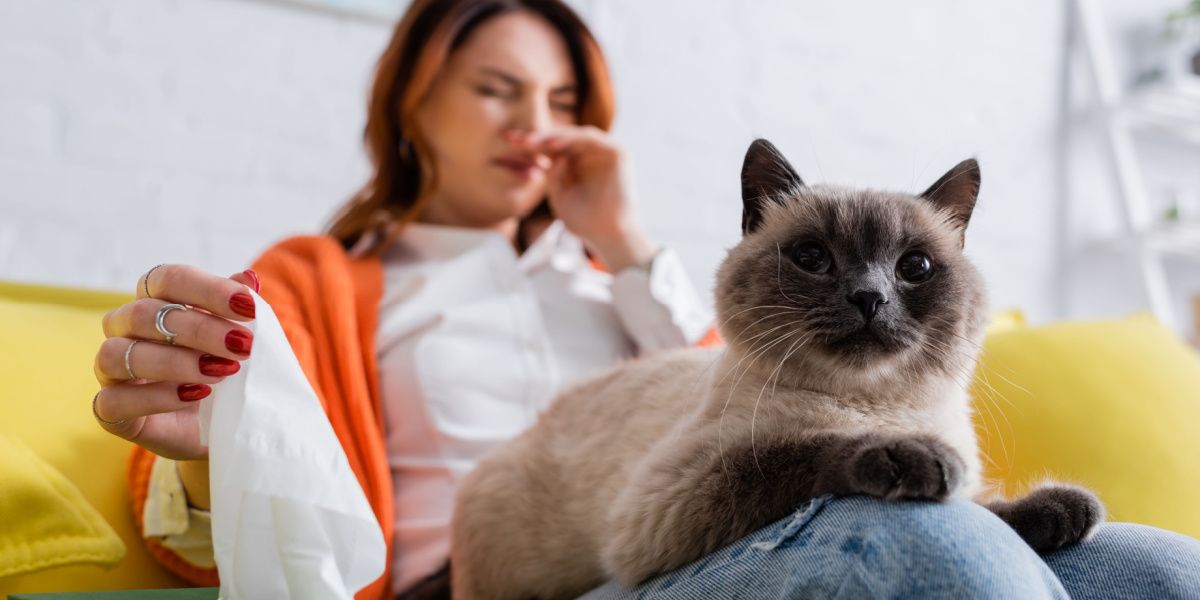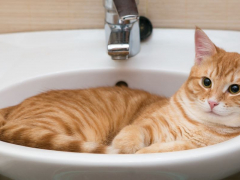
Shutterstock.com
You’re lying in bed with a heavy cold, and suddenly, your cat starts sneezing and looking unwell. It’s easy to assume your cat has caught your cold. But the human cold (like many viruses) is species-specific and can only survive in people.
Cats cannot catch colds from people, although they are not immune to all human respiratory viruses. Hundreds of viruses cause cold symptoms in people, some of the most common being the human rhinovirus and respiratory syncytial virus (RSV). However, some common feline-specific diseases produce similar symptoms and many other conditions might cause your cat’s runny nose.
Key Takeaways
The viruses that cause the common cold in humans cannot pass to your cat.
Cats may develop cold symptoms due to many common feline-specific conditions.
Diseases such as COVID-19 and influenza viruses are unlikely to pass between humans and cats.
Do Respiratory Infections Pass Between Humans and Cats?
Yes, some viruses occasionally pass between species. Diseases that pass between humans and animals are known as zoonoses or zoonotic diseases. Highly virulent avian influenza strains have been found to pass to humans and other mammals and between humans and cats. In Europe, cats have been experimentally infected with strains of the human flu virus. In addition, antibodies to the human influenza virus have been identified in cats. Mounting an immune response demonstrates that natural transmission is possible. Symptoms in cats are expected to be absent or mild. But with viruses constantly mutating and evolving, this might not always be the case.
The SARS-CoV-2 virus, which causes Covid-19 infections in people, has also been shown to pass between humans and cats. Again, symptoms are often milder in felines. The coronavirus causing COVID-19 should, however, not be confused with feline coronavirus, which is ubiquitous in the cat population and can lead to the development of feline infectious peritonitis (FIP).
What Can Cause Cold Symptoms in Cats?

Shutterstock.com
Cat flu is a catch-all term for diseases causing cold symptoms in cats. In most cases, these upper respiratory infections (URI) are caused by feline herpesvirus (or feline rhinotracheitis virus) or feline calicivirus. Neither can pass between cats and humans. Common symptoms of these infections include:
- Sneezing
- Discharge from the nose/eyes
- Fever
- Decreased appetite
- Sore gums (gingivitis/ulcers)
The severity of the condition can vary immensely. Some cats may have no symptoms at all, whereas others might be extremely sick and require hospital care. Secondary bacterial infections can complicate the condition and may lead to pneumonia. Pasteurella multocida is one such bacteria found in healthy cats’ airways that can cause a nasty infection when your cat becomes unwell.
Primary bacterial infections can also cause cold-like symptoms. Chlamydophila felis is a common cause of mild upper respiratory tract signs and sore, watery eyes in kittens. Bordetella bronchiseptica infections might cause coughing and chest infections that can be serious, particularly in very young cats.
Other Causes of Respiratory Symptoms in Cats
It’s important to know that there are lots of other causes of sneezing and coughing in cats. Feline asthma is a common issue that can lead to wheezy breathing and coughing fits. Allergies can trigger asthma or may just give your cat the sniffles.
If your cat sneezes and has a nasal discharge that isn’t clearing up, they may have chronic rhinitis (nasal passage inflammation). Rhinitis can be caused by primary inflammatory disease, a foreign body, ongoing allergies, bacterial and viral infections, fungal infections, and occasionally cancer.
However, if your cat has signs of rapid or labored breathing, you should seek veterinary care immediately. Difficulty breathing can be caused by upper airway inflammation or obstruction. Still, more commonly, it is a symptom of lung issues and can result from pneumonia, heart disease, or fluid in the chest.
How to Care For Your Cat With Cold Symptoms

Shutterstock.com
If you are worried your cat is unwell, schedule a trip to your vet as soon as possible. They can assess your cat thoroughly and decide if any tests or medication are needed. Once home, it is crucial to carefully monitor your cat’s symptoms in case they suddenly worsen. Most symptoms will resolve quickly with a little TLC at home. Ensure that they eat and drink well to keep them nourished and well-hydrated. Smelly foods such as cooked fish may help entice them to eat.
It is a good idea to keep your cat indoors, confined to an area of the house, so they can rest in bed with their food, water, and litter box nearby. You can clean runny eyes and noses with a saline solution using a clean cloth to make them more comfortable. Also, if your cat will tolerate being in a steam room (for example, when you take a shower) or you have access to a humidifier, this moistens the lungs and helps to clear their airways.
Transmission of disease, particularly viral infections, is extremely rare between humans and cats. However, our understanding of these conditions is constantly changing. So, it makes sense to exercise caution with our pets. If you or your cat are unwell, practice good hygiene, wash hands after each interaction, and keep their bedding, bowls, and litter box clean. That way, you can be sure you are doing your best to keep you and your cat safe.
Related Conditions:
- Feline Rhinotracheitis Virus (FFV)
- Feline Calicivirus
- Bordetella Bronchiseptica
- Feline Upper Respiratory Tract Infections
Frequently Asked Questions
How can I protect my cat from respiratory viruses?
Herpes and calicivirus vaccinations are widely available and effective. Once your cat has caught these viruses, they will be at risk of flare-ups of the disease lifelong, so preventing them from a young age is essential. If you have an immunocompromised cat, stopping contact with other cats will reduce their risk of catching cat flu.
Similarly, if your cat is unwell, keep them indoors. Outdoor cats can spread viruses to other cats in the neighborhood. If new cats enter the household, a quarantine period might be sensible, particularly if they are awaiting their first vaccinations.
How long does a cat cold last?
Most viral colds will last around 1–2 weeks in cats, and symptoms should gradually improve after the first day or two. If your cat is no better after a few days, see your veterinarian to ensure there are no signs of a more severe infection. If your cat has labored or rapid breathing at any time, see a vet immediately.
-
Frymus, T., Belák, S., Egberink, H., et al. (2021). Influenza Virus Infections in Cats. Viruses. 13(8), 1435
-
Stout, A.E., André, N.M., Jaimes, J.A., et al. (2020). Coronaviruses in cats and other companion animals: Where does SARS-CoV-2/COVID-19 fit? Veterinary Microbiology 247, 108777
-
https://www.vet.cornell.edu/departments-centers-and-institutes/cornell-feline-health-center/health-information/feline-health-topics/respiratory-infections







